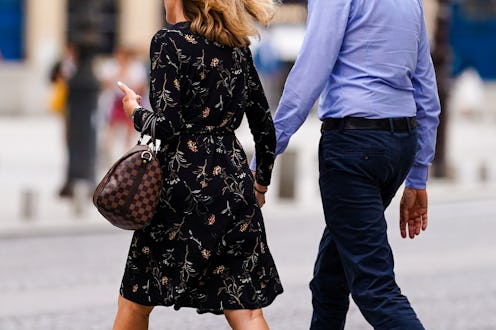(Living)
Should I Get Tested For COVID-19 Before Going On A Date?

Summer romances have taken an interesting turn as COVID-19 is still lingering and a cause for concern. But should you avoid getting any kind of love until the pandemic is over? Not necessarily. Knowing your options and getting some answers to common questions (like, Should I get a COVID test before going on a date?) can help ensure you have the safest possible dating experience with a new partner, even in the most unpredictable of times.
As mentioned before, one of the biggest questions that can come to mind is whether or not you should get tested for coronavirus before meeting up with a new partner. According to Dr. Abraar Karan, internal medicine doctor at Harvard Medical School and COVID-19 researcher, and Dating Coach, Carla Romo, the answer is an absolute yes.
“If you live in a high-transmission area, you should not be going on dates with many new people," says Dr. Karan to The Zoe Report. "Ideally, you should get a rapid antigen test or PCR test before you go on a date because you will be having close, face-to-face contact with them. But, remember, if you test negative that day, it is only a snapshot for that day. You could still turn positive two to three days later, so watch for symptoms, and if you are dating regularly, you would be prudent to be getting tested regularly as well.” Romo adds that just like one would get tested for an STD prior to sleeping with a new partner, they should exercise similar caution when it comes to COVID-19.
If you are having a difficult time finding a testing center or unable to book an appointment in your area, try an at-home test, like Lets Get Checked, which allows consumers direct access to a wide range of testing options and clinical support from home, including an FDA-authorized COVID-19 test. “For our COVID-19 test you receive your sample kit at home, you collect and return your sample via overnight shipping and, once our lab receives your sample, you will have your results within 48 hours,” explains Lets Get Checked epidemiologist Dr. Gwen Murphy, PhD, MPH.
Dr. Murphy says there are several factors to consider and discuss with a new partner or date that extend beyond a recent COVID test. “We need to think about what the coronavirus prevalence is in our immediate community," she explains. "If your town/region is in the middle of an outbreak, then you should stay home as advised by your local health authority. You should also consider whether you, or anyone in your household might be at particularly high risk because of a health condition or age (if you are in regular contact with a parent or grandparent, for example)."
That said, should you determine that both you and your new partner are in a position to meet up, Dr. Karan highly recommends keeping dates outdoors. “Indoor dining has continued to lead to the spread of COVID-19," he says. "I would also avoid going back to your date’s place, as you will be in close contact indoors and you have no idea how many other people they have been around or with. For a first date, I would definitely play it conservatively.”
Romo suggests having a conversation with your date about their comfort levels and moving forward with your planning from there. Her favorite outdoor dates include tennis, hiking, bike rides, socially distanced picnic, a coffee walk, or even a virtual dinner date to play it completely safe. “COVID dating etiquette is huge and it really depends on each person," says Romo. "If you are meeting your date in-person I would try things like air hugging. It's not romantic, but you can have fun and be silly with it. This takes the pressure off of getting right into each other's space. Make sure to also bring hand sanitizer if you touch or happen to eat outside, and wear your mask in crowded public places."
Now if you plan on some physical interaction or sexual activity with your date, the aforementioned precautions are a non-negotiable. You may also want to discuss the amount of people you both are seeing (and dating) on a regular basis to better determine risk. “It is best to minimize the number of [sexual] partners, ideally to just one, and make sure they are doing the same," says Dr. Karan. "Any additional partners is going to increase your risk." If your partner has had COVID recently, the CDC recommends allowing at least 10 days (or 20 for serious cases) to pass since symptom onset and at least 24 hours to pass since fever reduction (without the use of fever-reducing medications).
In a June 2020 advisory, the New York City health department suggested using masks while having sex with new partners or even using Zoom for a virtual experience. Dr. Karan explains that using masks may lessen the chance of respiratory droplets transmitting through heavy breathing but, depending on the mask type, it may not even be all that effective. “The safest way is to have a single partner for the time being who you can trust," he says. "That isn't possible for everyone, and wearing masks while hooking up doesn't seem like it will work too well. Unfortunately, I think the risk is there no matter which way you look at it, but it is lower where community transmission is under control."
If you think you’re showing symptoms of coronavirus, which include fever, shortness of breath, and cough, call your doctor before going to get tested. If you’re anxious about the virus’s spread in your community, visit the CDC for up-to-date information and resources, or seek out mental health support.